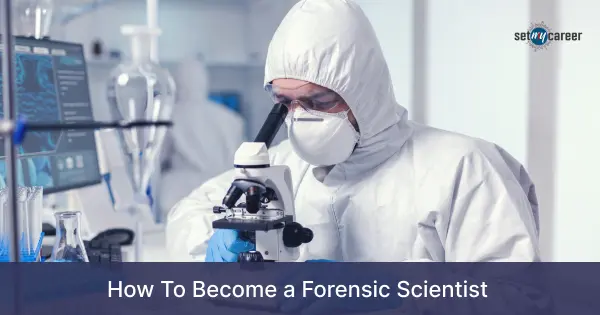
Published By Team Setmycareer on Sep 20, 2023 Updated On 03-11-2023
This guide will help you understand the steps and skills needed to become a Forensic Scientist. It outlines the extensive education, licensing requirements, and experience needed to succeed in this Science Career

So you want to be a forensic scientist? This exciting career combines science, investigation, and justice to help solve crimes. As a forensic scientist, you'll collect and analyze physical evidence from crime scenes to uncover clues that can identify suspects, causes of death, and other critical details.
Becoming a forensic scientist takes dedication and hard work, but it's an incredibly rewarding career for those who have an analytical mindset and passion for investigation.
Forensic Scientists use analytical and scientific techniques to examine evidence from crimes and prepare legal statements that summaries the results for court cases. Forensic Science work generally involves one or more areas of science Chemistry Involves the study of paint, chemicals, and similar substances and compounds.
Biology involves trace and DNA evidence, including blood, hair, fibers, etc. Drugs and toxicology Involves testing for the presence or absence of drugs, alcohol and poisons in blood, urine, and tissues samples.
The duties of a Forensic Scientist includes to carrying out laboratory examinations and analyses submitted by law enforcement agencies and medical examiners and serving as expert witnesses in a court of law. They also carry out tests using scientific techniques, such as infrared spectroscopy, mass spectrometry, and scanning electron microscopy. They are also engaged in inputting data into computer programs and utilizing relevant computer database information and developing, maintaining and updating work quality standards, standard operating procedures, and similar methods and procedures and Coordinating work with other members of the forensic team and with outside agencies.

Learn -How To Become a Forensic Science Technician
Are you feeling uncertain about your career path? Not sure which direction to take? Take the first step towards a fulfilling future
Here's a step-by-step guide on how to kickstart your journey into the world of forensic science:
Your first step toward becoming a forensic scientist is to earn a bachelor's degree, typically in a natural science field such as:
Some forensic scientists choose to specialize in a particular field, such as DNA analysis or ballistics. If you have a specialization in mind, opt for a major closely aligned with that subfield. However, if you want a broader education in forensic science, a degree in chemistry or biology will provide a solid scientific foundation.
During your undergraduate program, you can expect to take courses like:
You'll also gain valuable hands-on experience in labs and may have the opportunity to complete an internship, which will help you develop the investigative, analytical, and practical skills needed for success in this field.
Learn About - How To Become A Forensic Science Technician
While some forensic scientist positions require only a bachelor's degree, obtaining a graduate degree can expand your job prospects and earning potential. Common graduate programs for aspiring forensic scientists include:
When evaluating graduate programs, look for those with forensic science accreditation and hands-on lab work that aligns with your specialization goals.
In addition to formal education, most forensic science jobs require some lab or investigative experience. Here are some ways to gain relevant skills and experience during or after your studies:
Any experience that exposes you to the process of collecting and documenting evidence, conducting scientific analyses, and preparing technical reports will prove invaluable as you prepare for a career as a forensic scientist.
While certification is voluntary, it can demonstrate your competency and provide an advantage when applying for forensic science jobs. Two respected certifying organizations to consider are:
Keep in mind that maintaining continuing education credits and renewing certifications periodically is essential. It's advisable to get certified in your expected specialty, whether it's drug chemistry or DNA analysis.
Learn About - How To Become A Forensic Accountant
Once you have obtained the required degree, gained relevant experience, and obtained the necessary credentials, you'll be prepared to start applying for full-time forensic scientist positions. Entry-level positions to consider include:
You can find job openings with various organizations, including:
To build a strong and successful career as a forensic scientist, keep these additional tips in mind:
With your scientific acumen, analytical skills, and commitment to justice, an exciting career as a forensic scientist awaits. Follow the steps outlined in this guide to transform your dreams of crime scene investigation into a reality.
Disclaimer - This content has been made available for informational purposes only. Learners are advised to conduct additional research to ensure that courses and other College pursued meet their personal, professional, and financial goals. None of the companies, institutions or organisations mentioned in this article are associated with SetMyCareer.
We understand that making important career choices can be overwhelming and uncertain. The decisions you make today will shape your professional journey and have a lasting impact on your life. That's why we highly encourage individuals like you to talk to our experts before making any significant career decisions. Our team of experienced career counselors is here to provide you with the guidance and support you need to make informed choices that align with your aspirations and goals.
No. 14/595, 1st Floor, Nanjappa Reddy Layout, Koramangala 8th Block, Bangalore 560095